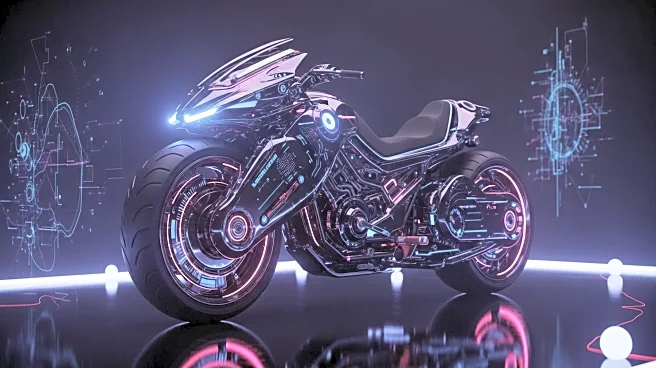What is the story about?
What's Happening?
The upcoming film 'Tron: Ares' marks the third installment in the 'Tron' franchise, featuring Jared Leto as Ares, an intelligent computer program. Ares begins to question his directives from CEO Julian Dillinger, played by Evan Peters, leading to a quest in the real world to find Eve Kim, portrayed by Greta Lee. The film explores the blurred lines between software programs and reality as Encom and Dillinger Systems race to find Kevin Flynn's permanence code. Production designer Darren Gilford, who worked on 'Tron: Legacy,' revisited ideas from Joseph Kosinski's scrapped sequel to the 2010 film. Gilford incorporated elements from the original concept art, creating life-size Dillinger lightcycles for the actors, which had to appear military-esque and practical. The bikes were designed with two critical riding positions and an aggressive high-speed position, featuring a special energy source to keep them running during filming.
Why It's Important?
The development of 'Tron: Ares' signifies a continuation of the 'Tron' franchise, which has been influential in the realm of science fiction and visual effects. The film's exploration of the intersection between technology and reality reflects ongoing societal discussions about the role of artificial intelligence and digital environments. The practical creation of lightcycles for the film showcases advancements in production design and the integration of real-world elements into digital narratives. This approach may influence future film productions, encouraging a blend of practical effects with digital technology to enhance storytelling and audience immersion.
What's Next?
As 'Tron: Ares' progresses towards its release, anticipation builds around its impact on the science fiction genre and its reception by audiences familiar with the franchise. The film's exploration of AI and digital environments may spark discussions among tech enthusiasts and film critics about the portrayal of technology in media. The practical design of the lightcycles could set a precedent for future productions, potentially influencing how filmmakers approach the integration of real-world elements in digital narratives. Stakeholders in the film industry may closely monitor the film's performance to gauge audience interest in such hybrid production techniques.
Beyond the Headlines
The creation of practical lightcycles for 'Tron: Ares' highlights the evolving relationship between digital and physical production techniques in filmmaking. This development may encourage filmmakers to explore new methods of storytelling that combine traditional and digital elements, potentially leading to innovative cinematic experiences. The film's narrative, which questions the directives of AI, may also contribute to broader cultural discussions about the ethical implications of artificial intelligence and its role in society. As technology continues to advance, the themes explored in 'Tron: Ares' could resonate with audiences, prompting reflection on the future of human-computer interactions.
















